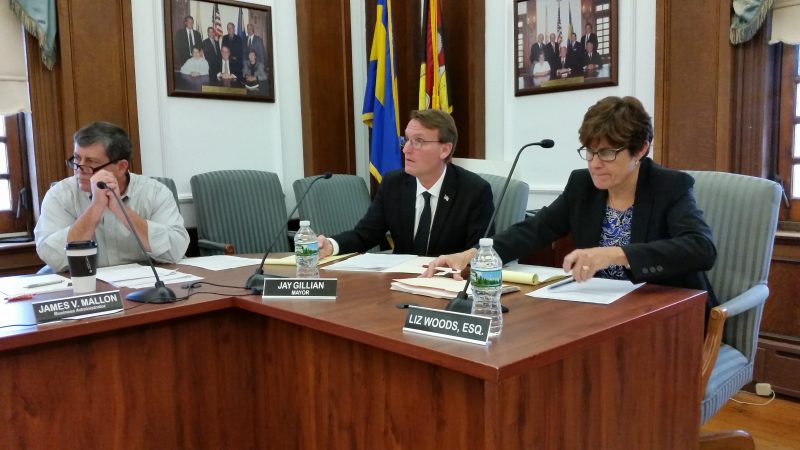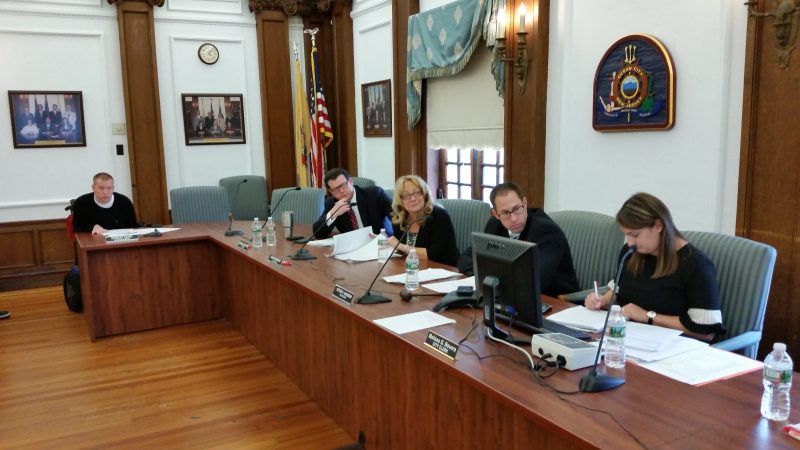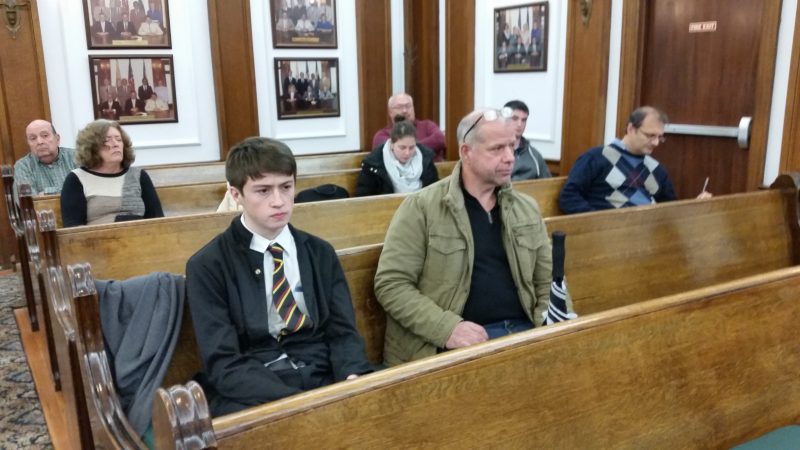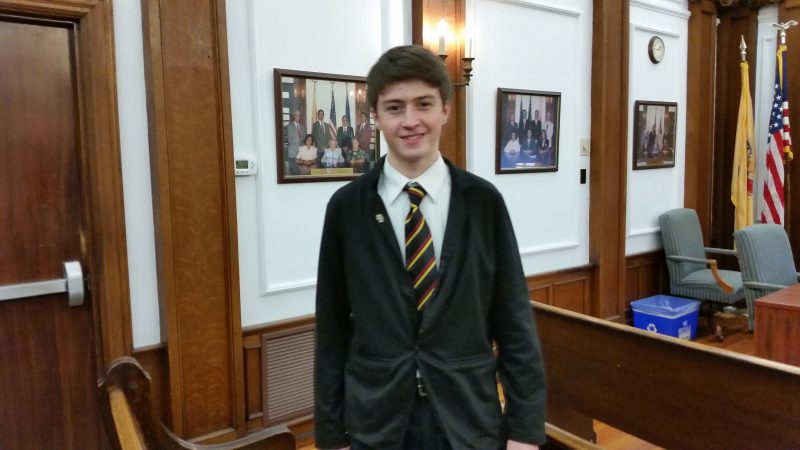John Nicoletti, 16, who plays the guitar on the Boardwalk, says performers would have to "jump through hoops" to get a license.
 By Donald Wittkowski
Confronted with more complaints about plans for fingerprinting and criminal background checks, Mayor Jay Gillian indicated Thursday he is willing to revise a proposed ordinance that would regulate Ocean City’s Boardwalk performers for the first time.
The measure, introduced by City Council on Dec. 8 and scheduled for a public hearing and final vote Jan. 12, would restrict the performers to specially designated areas of the Boardwalk instead of giving them unfettered access to the city’s most heavily visited tourist attraction.
Addressing the public during Thursday’s Council meeting, Gillian said the regulations are needed for crowd control during the busy summer tourism season. He noted that the Boardwalk Merchants Association requested the ordinance to prevent large crowds from milling around the entertainers and blocking access to their stores.
Wes Kazmarck, president of the Boardwalk Merchants Association, has called the ordinance “a very good compromise” that represents a win for both sides.
Reiterating comments he made in early December, the mayor said he hopes to avoid conflicts between the merchants and the performers by crafting regulations that would balance the rights of both sides. He pledged he is “absolutely going to work with everybody” before sending a final version of the ordinance to Council for a vote.
“I will be fair,” he said. “It’s far from a done deal.”
By Donald Wittkowski
Confronted with more complaints about plans for fingerprinting and criminal background checks, Mayor Jay Gillian indicated Thursday he is willing to revise a proposed ordinance that would regulate Ocean City’s Boardwalk performers for the first time.
The measure, introduced by City Council on Dec. 8 and scheduled for a public hearing and final vote Jan. 12, would restrict the performers to specially designated areas of the Boardwalk instead of giving them unfettered access to the city’s most heavily visited tourist attraction.
Addressing the public during Thursday’s Council meeting, Gillian said the regulations are needed for crowd control during the busy summer tourism season. He noted that the Boardwalk Merchants Association requested the ordinance to prevent large crowds from milling around the entertainers and blocking access to their stores.
Wes Kazmarck, president of the Boardwalk Merchants Association, has called the ordinance “a very good compromise” that represents a win for both sides.
Reiterating comments he made in early December, the mayor said he hopes to avoid conflicts between the merchants and the performers by crafting regulations that would balance the rights of both sides. He pledged he is “absolutely going to work with everybody” before sending a final version of the ordinance to Council for a vote.
“I will be fair,” he said. “It’s far from a done deal.”
 City Council is scheduled to hold a public hearing and take a final vote on the ordinance on Jan. 12.
Drawing the strongest objections from the public are provisions in the ordinance that would require adult-age performers to undergo fingerprinting and background checks to confirm they don’t have a serious criminal history. Anyone with a criminal history of “dishonesty” or a fourth-degree crime or higher would be barred from having a performer’s license, according to the ordinance.
Performers under 18 years old would not be fingerprinted, but their parents or other adult guardians would be fingerprinted under the version of the ordinance introduced by Council. Gillian made comments Thursday that suggested he will consider revising or dropping the fingerprinting requirement before the measure comes up for a final vote.
“It’s far from over. I know fingerprinting and background checks are harsh,” he said.
The ordinance would require performers to pay $50 for a license. In addition, they would be charged a $25 administrative fee to pay for the cost of fingerprinting and background checks.
Members of the public who spoke during Thursday’s Council meeting called the fingerprinting requirement onerous and intrusive. They said they believe the criminal background checks are an attempt to keep performers off the Boardwalk. They echoed comments that were made by other opponents of the ordinance when the measure was first introduced.
City Council is scheduled to hold a public hearing and take a final vote on the ordinance on Jan. 12.
Drawing the strongest objections from the public are provisions in the ordinance that would require adult-age performers to undergo fingerprinting and background checks to confirm they don’t have a serious criminal history. Anyone with a criminal history of “dishonesty” or a fourth-degree crime or higher would be barred from having a performer’s license, according to the ordinance.
Performers under 18 years old would not be fingerprinted, but their parents or other adult guardians would be fingerprinted under the version of the ordinance introduced by Council. Gillian made comments Thursday that suggested he will consider revising or dropping the fingerprinting requirement before the measure comes up for a final vote.
“It’s far from over. I know fingerprinting and background checks are harsh,” he said.
The ordinance would require performers to pay $50 for a license. In addition, they would be charged a $25 administrative fee to pay for the cost of fingerprinting and background checks.
Members of the public who spoke during Thursday’s Council meeting called the fingerprinting requirement onerous and intrusive. They said they believe the criminal background checks are an attempt to keep performers off the Boardwalk. They echoed comments that were made by other opponents of the ordinance when the measure was first introduced.
 Father and son Rich and John Nicoletti want the city to scrap the proposed Boardwalk regulations.
“I think background checks and fingerprinting are overbearing,” said Rich Nicoletti, a Philadelphia and Ocean City resident whose 16-year-old son, John, is a Boardwalk performer.
Nicoletti also objected to a provision in the ordinance that would require underage performers to be accompanied by a parent or another adult while they are on the Boardwalk.
“I don’t think parents need to stand next to a child playing a musical instrument on the Boardwalk,” he said.
John Nicoletti, a junior at Archbishop Ryan High School in Philadelphia, began playing guitar on the Boardwalk four years ago. He said it is a way for him to earn $300 to $500 over the summer, but he mainly does it to improve his guitar playing and socialize with people who enjoy his music.
“We meet people, have fun and entertain others,” John Nicoletti told the Council members, while urging them to kill the ordinance.
The younger Nicoletti also said the fingerprinting requirement, background checks and proposed fees would force performers to “jump through hoops” to secure a license.
Father and son Rich and John Nicoletti want the city to scrap the proposed Boardwalk regulations.
“I think background checks and fingerprinting are overbearing,” said Rich Nicoletti, a Philadelphia and Ocean City resident whose 16-year-old son, John, is a Boardwalk performer.
Nicoletti also objected to a provision in the ordinance that would require underage performers to be accompanied by a parent or another adult while they are on the Boardwalk.
“I don’t think parents need to stand next to a child playing a musical instrument on the Boardwalk,” he said.
John Nicoletti, a junior at Archbishop Ryan High School in Philadelphia, began playing guitar on the Boardwalk four years ago. He said it is a way for him to earn $300 to $500 over the summer, but he mainly does it to improve his guitar playing and socialize with people who enjoy his music.
“We meet people, have fun and entertain others,” John Nicoletti told the Council members, while urging them to kill the ordinance.
The younger Nicoletti also said the fingerprinting requirement, background checks and proposed fees would force performers to “jump through hoops” to secure a license.
 John Nicoletti, 16, who plays the guitar on the Boardwalk, says performers would have to "jump through hoops" to get a license.
After the meeting, the Nicolettis told reporters that they want nothing short of a complete repeal of the ordinance.
“I think the way it is written, it should be scrapped,” Rich Nicoletti said. “I don’t see a problem with 99.9 percent of the performers on the Boardwalk.”
John Nicoletti said he simply won’t perform on the Boardwalk if the regulations are put in place.
“I think they should back off completely. On a scale of one to 10, it’s a 10,” he said, using the higher number as a gauge of how troublesome he believes the ordinance would be to performers.
Suzanne Mancus, a local resident, said her 15-year-old grandson from Chicago has played the fiddle on the Boardwalk during the summer and has always had a pleasant experience. But, she added, he wouldn’t have performed if he had faced fingerprinting or other requirements for getting a license.
Responding to the complaints, the mayor said the regulations should not be seen as a deterrent for Boardwalk performers. At the same, he stressed that the city needs to do “a better job” of explaining the reasons for the ordinance.
“We’re not going to do anything that’s going to stop kids from expressing themselves, or anybody else,” he said.
Gillian said the vast majority of performers seem respectful of the Boardwalk’s family-friendly atmosphere. He expressed concerns about a small number of “bad players” who cause trouble for police.
Jim Tweed, an Ocean City resident and president of the local government watchdog group Fairness In Taxes, believes the ordinance would turn the police into “babysitters” to make sure underage performers were following the regulations. He said he would rather have the police focusing their efforts on protecting the city from serious criminals.
Tweed, emphasizing that he was speaking for himself, not Fairness In Taxes, also questioned the need to fingerprint the performers. He also said he thought it was unnecessary to have parents or other adults accompany underage performers.
“If you think this is not going to create a burden for adults, please think about it further,” Tweed said.
Under the ordinance, performers would be allowed on the ocean side of the Boardwalk at Seventh, Eighth, Ninth, 10th
John Nicoletti, 16, who plays the guitar on the Boardwalk, says performers would have to "jump through hoops" to get a license.
After the meeting, the Nicolettis told reporters that they want nothing short of a complete repeal of the ordinance.
“I think the way it is written, it should be scrapped,” Rich Nicoletti said. “I don’t see a problem with 99.9 percent of the performers on the Boardwalk.”
John Nicoletti said he simply won’t perform on the Boardwalk if the regulations are put in place.
“I think they should back off completely. On a scale of one to 10, it’s a 10,” he said, using the higher number as a gauge of how troublesome he believes the ordinance would be to performers.
Suzanne Mancus, a local resident, said her 15-year-old grandson from Chicago has played the fiddle on the Boardwalk during the summer and has always had a pleasant experience. But, she added, he wouldn’t have performed if he had faced fingerprinting or other requirements for getting a license.
Responding to the complaints, the mayor said the regulations should not be seen as a deterrent for Boardwalk performers. At the same, he stressed that the city needs to do “a better job” of explaining the reasons for the ordinance.
“We’re not going to do anything that’s going to stop kids from expressing themselves, or anybody else,” he said.
Gillian said the vast majority of performers seem respectful of the Boardwalk’s family-friendly atmosphere. He expressed concerns about a small number of “bad players” who cause trouble for police.
Jim Tweed, an Ocean City resident and president of the local government watchdog group Fairness In Taxes, believes the ordinance would turn the police into “babysitters” to make sure underage performers were following the regulations. He said he would rather have the police focusing their efforts on protecting the city from serious criminals.
Tweed, emphasizing that he was speaking for himself, not Fairness In Taxes, also questioned the need to fingerprint the performers. He also said he thought it was unnecessary to have parents or other adults accompany underage performers.
“If you think this is not going to create a burden for adults, please think about it further,” Tweed said.
Under the ordinance, performers would be allowed on the ocean side of the Boardwalk at Seventh, Eighth, Ninth, 10th